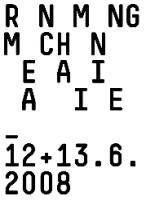The renaming machine
dal 11/6/2008 al 18/6/2008
Segnalato da
Ednooki
Albert Heta
Irwin
Hristina Ivanoska
Sanja Ivekovic
Tanja Lazetic/Dejan Habicht
Monument
Oliver Musovik
Dan Perjovschi
Tadej Pogacar
Saso Stanojkovik
Zaneta Vangeli
Suzana Milevska
11/6/2008
The renaming machine
Jacopic Gallery, Ljubljana
The project looks at the complex entanglements involved in the political and cultural processes of renaming. Its main concept reflects the crucial need to question to what extentrenaming has influenced the construction and destabilisation of the memory of national, cultural and personal identities. Curated by Suzana Milevska.

Curated by Suzana Milevska
EDNOOKI, Albert Heta, IRWIN, Hristina Ivanoska, Sanja Iveković, Tanja Lažetić/Dejan Habicht, MONUMENT, Oliver Musoviќ, Dan Perjovschi, Tadej Pogačar & P.A.R.A.S.I.T.E. Museum of Contemporary Art, Sašo Stanojkoviќ, Žaneta Vangeli
The P.A.R.A.S.I.T.E. Institute – Ljubljana is pleased to announce the launch of The Renaming Machine project with the opening of an exhibition on 12 June at the Jakopič Gallery in Ljubljana, and on the following day, a one-day conference. According to Jacques Derrida's On the Name one gives names to the ones he/she loves because to give a name to someone is an ultimate gift. The question posed by the Renaming Machine is whether this can be true for renaming and what residues after the renaming overwrites the old references on the historic »mystic pad«.
The project The Renaming Machine looks at the complex entanglements involved in the political and cultural processes of renaming. Its main concept reflects the crucial need to question to what extentrenaming has influenced the construction and destabilisation of the memory of national, cultural and personal identities and what actually happens in the field of representation, visual culture and politics whenever names are replaced or assigned by the renaming “apparatus”. Alongside the arbitrary nature of names and other theoretical implications of renaming, the project examines clandestine patterns of the “desiring renaming machine” at work behind the dominant social machines. In the Balkans, a region that abounds with the politics of renaming, the changes in the names of institutions, peoples, languages, toponyms and states were usually viewed as a way to protect long-term political interests and ensure the domination over a territory. The conceptual “war of names” that as an outwitting game continues between Greece and the former Yugoslav Republic of Macedonia, is the best example of how the endlessly postponed event of renaming can enable a “state of exception”.
The project will examine various artistic, cultural and theoretical phenomena associated with renaming: identitarian and gender politics, the right of self-determination, nominalism, descriptions and direct referents, signature, facsimile and deconstruction of originality, proper names, performative speech acts, symbols and insignia of states, nations, ethnicities, overwriting the memory of cities, streets, and monuments, renaming as appropriation of subjects and territories, the name of the father/symptom-names, pseudonyms, anonymity, and (re)naming of art groups and movements, divine and secret names, economic value of names in branding and copy right, etc.
Conference Programme
13 June, 12 – 7 p.m.
12:00- 13:30
Traces of Memory: Writing, Erasing and Forgetting
Ivaylo Ditchev: Educating the dispersed gaze
Aldo Milohnić: No Name
Moderator: Suzana Milevska
14:00 – 15:00
Imaginary Institution of Naming/Renaming
Dušan Mandić: IRWIN/NSK: Political and cultural implications of naming/renaming
Albert Heta: Embassy and Pavilion
Moderator: Lana Zdravković
16:00-17:00
Desiring Machines of Renaming
Suzana Milevska: Potentialities of Renaming: Negation or Agency
Tanja Lažetić, Dejan Habicht: No Remembrance, No Comradeship
Moderator: Slavčo Dimitrov
17:15-19:00
Discussion About an Artwork:
The Politics of Memory/Lecture room no 1: An Archive Perspective on Renaming
Monument group: Darinka Pop-Mitić, Svebor Midžić, Branimir Stojanović, Milica Tomić
A comprehensive publication edited by the Skopje-based curator and theorist Suzana Milevska and published by the P.A.R.A.S.I.T.E. Institute is planned as the culminating segment of the project.
This two-year project consisting of a series of curated exhibitions and conferences, research-based art projects and public discussions, is being realised as part of Patterns, the new cultural programme of the ERSTE Foundation, in a partnership between the P.A.R.A.S.I.T.E. Institute – Ljubljana, The Peace Institute – Ljubljana, press to exit project space – Skopje, and Stacion – Prishtina.
The exhibition is made possible by the enormous contribution of the participating artists as well as the generous support of the ERSTE Foundation, European Cultural Foundation (ECF), The Municipality of Ljubljana, Ministry of Culture of Republic of Slovenia, The Swiss Cultural Programme – Macedonia, The Ministry of Foreign Affairs of the Republic of Slovenia, Division for International Cultural Relations.
Opening 12 June, 2008, 8 P.M.
Jakopič Gallery
Slovenska 9 - 1000 Ljubljana



